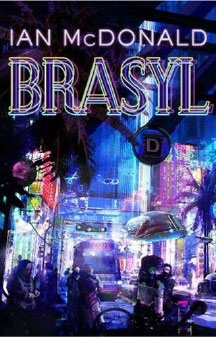 |
 Ian McDonald
Ian McDonald
Brasyl
Reviewed by: Dustin Kenall © 2008
Pyr / Prometheus Books
US First Edition Hardcover
ISBN 978-1-59102-543-6
357 pp.; $25.00
Publication Date: 05-03-2007
Date Reviewed: 08-14-2008
Index:
Science Fiction
General Fiction
Fantasy
'Brasyl', the excellent new time and genre-splicing novel from Ian McDonald, bills itself as “BladeRunner in the tropics.” The comparison is disingenuous (and clichéd): where BladeRunner married a noir sensibility with dystopian manga visuals, McDonald’s novel exults in a bigger-brighter-faster cyberpunk ethos. It is also unnecessary. 'Brasyl' presents a world (in fact a world of worlds) completely of its author’s own messy, fractal imagining — a rainforest society poised between fecundity and rot where Indios shamans let slip the veils of reality, Portuguese priests establish their own earthly Cidade de Deos, reality TV producers rake the slums to slake the public thirst for exhibitionist depravity, and the cyber angels of perpetual surveillance stream the skies, watchful, recording all. There are many sights to see in 'Brasyl'.
The novel consists of three distinct stories in which connections increasingly appear. The first occurs in present-day Sao Paulo, Brazil, where Marcelina Hoffman, an ambitious reality TV producer looking for her next great show after such hits as Filthy Pigs, Kitsch and Bitch, and The Real Sex in the City, decides to track down a soccer goalkeeper blamed for Brazil’s loss of the 1950 World Cup. Her boss, a pretentious technophile who spews faux-hip IM-speak such as IPTRB (It Presses the Right Buttons) and IRTAMD (I’m Ready to Announce My Decision), gives her the green light. She begins to trace the former goalie’s whereabouts but is interrupted when a doppelganger emerges bent on sabotaging her career.
Twenty-five years in the future, Edson Jesus Oliveira de Freitas is also encountering doppelgangers. He falls in love and goes on the run with one of a woman named Fia Kishida, “just a plain quantum-computing postgrad specializing in multiversal economic modeling,” who is murdered. It is difficult to hide, they find, when nanobot surveillance drones swarm the sky and coordinate with ubiquitous RFID chips on the ground. Fia II explains that her world is “less paranoid. We don’t watch each other all the time. But it’s more . . . broken . . . . . We leave bits of ourselves all over the place: memories, diaries, names, experiences, knowledge, friends, personalities even.”
The third story takes place in the 18th century and follows Father Luis Quinn, a Jesuit with a violent past and a facility with languages, on his mission to find a renegade priest who is building his own church in the rainforest’s heart of darkness. Quinn has requested a difficult task and his prayer is answered. He meets a French scientist who shows him the science-ruled future: a primitive Governing Engine. “A universe ruled by number, running like punched cards through the loom of God.” Earlier, he witnesses the conquistadores, after a plague exterminates all beasts of burden, reduce the natives to human mules — a repudiation of the Enlightenment creed that nature had not contrived to have some men born with saddles on their backs and others “booted and spurred” to ride them. Father Diego, Father Luis’s prey, is no more forgiving: “Citizens of heaven, subjects of Christ the King . . . . They come to me as animals, deceptions in the shape of men. I offer them the choice Christ offers all: Accept his standard and . . . become men, become souls. Or choose the . . . inevitable lot of the animal, to be yoked and bound to a wheel.”
While there is enough material here for a quite longer book, McDonald knows that not every meal need be a banquet. 'Brasyl' is, thus, a repast meant to delight and surprise not to sate the senses. Those appreciative of the author’s flair but harboring larger appetites may enjoy McDonald’s 'River of Gods' — twice as long but just as deep.
As the novel progresses, the different characters with their stories, their lives, their settings, and their worlds swirl together across space and time. This is a tricky task, but McDonald succeeds because of his ability to ground the reality of his foreign locales with evocative descriptions. “Rio had always been a city of shifting realities, hill and sea, the apartment buildings that grew out of the sheer rock of the morros, the jarring abutments of million-real houses with favela newlywed blocks, piled one on top of another. And where the realities overlap, violence spills through.” Nor is life easier for those exiled to the jungles of “green and mold, water and heat and broken light, mists and vapors, and the flat, gray meanders of endless rivers. Canoes and bows and creatures heard but seen only in glimpses, a world without vistas, its horizon as distant as the next tree, the next vine, the next bend in the river. A vegetable world, vast and slow.”
Like the characters, the reader comes to realize that “the flimsiest of girder works over the deepest of abysses, that this world, these streets, the skirt of rooftops spread out beneath like a first Communion frock, the blue sea and the blue sky and the green forest of the hills, even the soccer ball . . . carried with the clumsiness of a geek-boy, were a weave of words and numbers . . . . An improvised found-source favela solution.” With his shimmering visions and sprawling prose, McDonald is both a creator and destroyer of worlds. It is a pleasure to watch him at work.
|
 |
